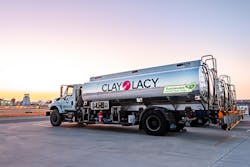Clay Lacy Teams with World Fuel Services and World Energy to Offer Sustainable Aviation Fuel (SAF) at Van Nuys and Orange County FBOs, Transitions Ground Support Vehicles to Renewable Diesel
Clay Lacy Aviation will offer Sustainable Aviation Fuel (SAF) at the company’s two FBOs at Van Nuys Airport and John Wayne Orange County Airport. SAF is an important component of Clay Lacy’s comprehensive sustainability strategy. World Fuel Services (World Fuel) begins monthly SAF deliveries to both locations this month, with 2021 deliveries to total a minimum of 100,000 gallons. World Fuel is also providing renewable diesel (RD) fuel to power Clay Lacy’s fuel trucks, GPUs, tugs and other ground support vehicles. SAF reduces net greenhouse gasses by up to 80 percent. This represents a reduction of approximately 192 tons of carbon this year, the equivalent of 475,000 miles driven by an average car. Clay Lacy’s transition to renewable diesel will eliminate 64.5 tons of carbon in 2021, the equivalent of 8,225,828 smartphones charged.
The SAF and RD delivered to Clay Lacy is produced by World Energy, a green energy solutions provider that empowers leaders in transportation sector to make meaningful and immediate progress toward reducing carbon emissions. The SAF is produced from inedible agricultural wastes and is certified by the Roundtable on Sustainable Biomaterials.
“We are delighted to begin providing a regular supply of SAF and renewable diesel to both Clay Lacy FBOs,” said Darren Fuller, World Fuel Services. “Demand for SAF is growing and it is rewarding to work with Clay Lacy to help our industry achieve its goal of cutting carbon emission in half by 2050.”
“World Fuel is a key partner in our sustainability strategy, implementing a broad range of initiatives to significantly reduce our carbon footprint,” said Scott Cutshall, Clay Lacy’s SVP of Business Operations. “Developed in concert with their sustainability experts at World Kinect Energy, our strategy also includes carbon offset programs for aircraft management clients, and Van Nuys and Orange County FBO customers, as well as renewable energy and sustainable purchasing, construction and operating practices. We are proud to report that all Clay Lacy facilities have achieved net-zero carbon status for calendar years 2019 and 2020.”
Clay Lacy is also a member of the National Air Transportation Association (NATA) and serves on its Environment Committee. NATA has been a strong advocate for increasing the production and availability of SAF at federal, state and local levels through the Business Aviation Coalition for Sustainable Fuel. “It is rewarding to see the efforts of our team and industry partner organizations result in a greater awareness, adoption and supply of SAF,” said Timothy Obitts, president and CEO, NATA. “Clay Lacy and World Fuel are leading the way to an exciting future.”
Tested and verified by aircraft, engine and component manufacturers worldwide, SAF is a safe, reliable drop-in fuel — which means that no modifications are required to the aircraft or other equipment. SAF supports compliance with emerging international emissions standards, allowing business jet operators to achieve corporate social responsibility goals and demonstrate the industry’s commitment to addressing climate change.
“We exist to empower leaders to reduce their transportation-based carbon footprint,” said Bryan Sherbacow, chief commercial officer at World Energy. “By making SAF accessible to the business jets flying out of their FBOs, Clay Lacy is leading a shift toward more sustainable operations and creating the opportunity for others to benefit from using cleaner fuels.”
Made by hydrotreating non-petroleum-based feedstocks, renewable diesel fuel burns cleanly and efficiently in all diesel engines with no modifications required to the motor or the vehicle. Nontoxic and biodegradable, renewable diesel has up to 80 percent lower carbon intensity than regular diesel.




